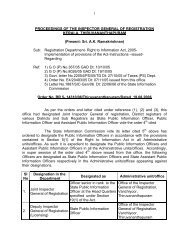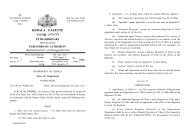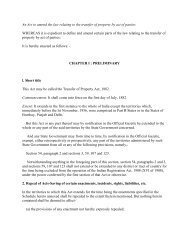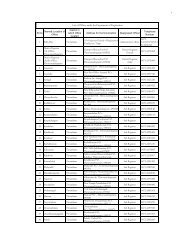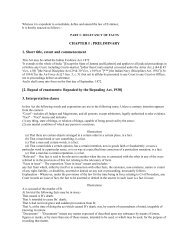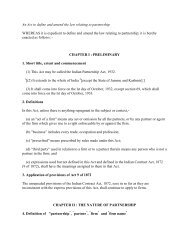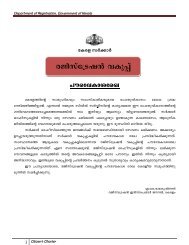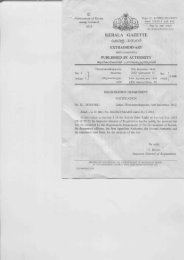The Special Marriage Act-1954 - Registration
The Special Marriage Act-1954 - Registration
The Special Marriage Act-1954 - Registration
Create successful ePaper yourself
Turn your PDF publications into a flip-book with our unique Google optimized e-Paper software.
(a) that the petitioner was at the time of the marriage ignorant of the facts alleged;<br />
(b) that proceedings were instituted within a year from the date of the marriage; and<br />
(c) the marital intercourse with the consent of the petitioner has not taken place since the<br />
discovery by the petitioner of existence of the grounds a decree :<br />
Provided further that in the case specified in Cl.(iii), the Court shall not grant a decree if,-<br />
(a) proceedings have not been instituted within one year after the coercion had ceased or, as<br />
the case may be, the fraud had been discovered; or<br />
(b) the petitioner has with his or her free consent lived with the other party to the marriage as<br />
husband and wife after the coercion had ceased or as the case may be, the fraud had been<br />
discovered.<br />
26. Legitimacy of children of void and voidable marriages.-<br />
(1) Notwithstanding that a marriage is null and void under Sec. 24, any child of such marriage<br />
who would have been legitimate if the marriage had been valid, shall be legitimate, whether<br />
such child is born before or after the commencement of the <strong>Marriage</strong> Laws(Amendment) <strong>Act</strong>,<br />
1976, and whether or not a decree of nullity is granted in respect of that marriage under this<br />
<strong>Act</strong> and whether or not the marriage is held to be void otherwise than on a petition under this<br />
<strong>Act</strong>.<br />
(2) Where a decree of nullity is granted in respect of a voidable marriage under Sec.25, any<br />
child begotten or conceived before the decree is made, who would have been the legitimate<br />
child of the parties to the marriage if at the date of the decree it has been dissolved instead of<br />
being annulled, shall be deemed to be their legitimate child notwithstanding the decree of<br />
nullity.<br />
(3) Nothing contained in sub-section (1) or sub-section (2) shall be construed as conferring<br />
upon any child of a marriage which is null and void or which is annulled by a decree of nullity<br />
under Sec. 25, any rights in or to the property of any person, other than the parents, in any<br />
case, where, but for the passing of this <strong>Act</strong>, such child would have been incapable of<br />
possessing or requiring any such rights by reason of his not being the legitimate child of his<br />
parents.<br />
27. Divorce.-(1) Subject to the provisions of this <strong>Act</strong> and to the rules made thereunder, a<br />
petition for divorce may be presented to the District Court either by the husband or the wife on<br />
the ground that the respondent-<br />
(a) has, after the solemnization of the marriage had voluntary sexual intercourse with any<br />
person other than his or her spouse; or<br />
(b) has deserted the petitioner for a continuous period of not less than two years immediately<br />
proceeding the presentation of the petition; or<br />
(c) is undergoing a sentence of imprisonment for seven years or more for an offence as defined<br />
in the Indian Penal Code (45 of 1860); or<br />
(d) has since the solemnization of the marriage treated the petitioner with cruelty; or<br />
(e) has been incurably of unsound mind, or has been suffering continuously or intermittently<br />
from mental disorder of such a kind, and to such an extent that the petitioner cannot<br />
reasonably be expected to live with the respondent.



